BONews Service, an online development news platform focused on women, persons with disabilities, and children, has called for the implementation of regional and global frameworks that would protect and promote equal access to Persons with Disabilities (PWDs) in the digital space.
The call was made during a panel discussion titled: “Digital accessibility: eliminating digital barriers among persons with disabilities” during the Digital Rights and Inclusion Forum (DRIF) 2023 in Nairobi, Kenya.
While speaking at the session, Blessing Oladunjoye, Founder of BONews Service, explained that there are numerous barriers that limit PWDs from interacting easily with digital platforms.
Oladunjoye who said that digital platforms and different innovations have helped to create an independent living for people globally stressed that innovations need to meet accessibility standards to ensure that PWDs are not excluded.
She said “an accessible internet is not just for PWDs, it is for everybody. It is important that organizations and web developers that are designing digital innovations incorporate the needs of PWDs at the planning stage.”
Derick Shimoli, a representative of Kenya Union of the Blind who demonstrated how an inaccessible website could reinforce the barriers that PWDs encounter in society said that it is important that all websites and digital platforms incorporate accessibility guidelines.
Shimoli also added that partnerships between members of the disability community and web developers can help address the huge gap that currently exists.
For his part, John Wambua, a communications expert at the United Disabled Persons of Kenya (UDPK) said websites should comply with the principles of operability, interactivity, accessibility, and understandable to end users.
Wambua emphasized the importance of text descriptions in tabulations of data, graphics, and the use of alternate text, which according to him would help to make the digital space accessible to all PWDs.
He also commended BONews Service for spotlighting the issues of digital access for PWDs, stressing that “people usually think about accessibility in the context of physical access but bringing to the fore the issues of access in the digital space is really germane and important.”
Olamide Mobolaji, a Software Developer, acknowledged that there is room for improvement to enhance digital access for PWDs.
Mobolaji also harped on the need for collaborations with civil society actors and stressed that PWDs should give feedback to tech experts on how to improve their work and enhance compliance with frameworks on digital access for PWDs.

